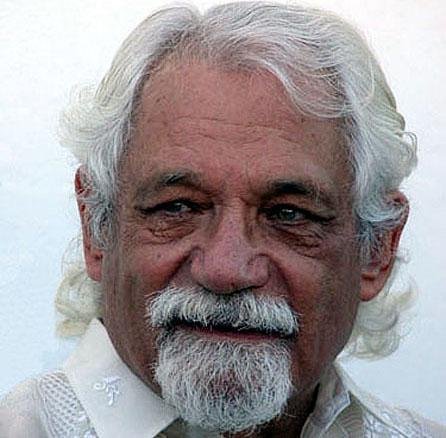
Notes on Pablo Armando Fernández
Pablo Armando Fernández was justly praised for his extraordinary literary work in poetry and novels, as well as for his patriotic and revolutionary attitude, during the forum held at Uneac in the context of the International Book Fair.
Translated and edited by Walter Lippmann for CubaNews.

Writer Pablo Armando Fernández, honored at the Fair. Photo: Pastor Batista
Pablo Armando Fernandez was justly praised for his extraordinary literary work in poetry and novels, as well as for his patriotic and revolutionary attitude, during the forum or tertulia held at Uneac in the context of the International Book Fair.
Miguel Barnet, president of the Uneac, dwelt on the character of the author of such important works as Los niños se despiden, Casa de las Américas Prize 1968; Golpe de dados, or the first-born Salterio y lamentaciones, among many of great literary flight and reception of the reader.
Barnet’s words were preceded by speeches by writers Enrique Saínz, Juan Nicolás Padrón and Nancy Morejón.
Barnet, more than Armando’s work, wanted to refer to his life, both to the intimate love with his wife Maruja, as everyone knew her, and to his unwavering attitude in defense of culture in the Revolution. He shared singular anecdotes about Pablo Armando, whom Fidel honored by visiting him at his home.
He especially focused on the celebration of the writer’s 70th birthday, which was also attended, among other intellectual friends, by Gabriel García Márquez, later winner of the Nobel Prize in Literature.
The Forum began with the reading of a letter from Roberto Fernández Retamar, who met Pablo Armando when he was living in New York and had not yet published his first book, which turned out to be the famous Psalter and Lamentations.
The exhaustive and rich exposition on Pablo Armando’s immense work in poetry and prose turned out to be an extraordinary piece, whose publication, in the Gaceta, was proposed by Barnet, as it would be necessary to resort to it in order to know the literary work of Pablo Armando, National Literature Prize winner.
Enrique Saínz also referred to how much his birth and life, until he was 15 years old, in the Batey del Central Delicias and in the surroundings of Chaparra, in the former province of Oriente, could have influenced the intellectual.
Juan Nicolás Padrón fundamentally approached Pablo Armando’s poetic work, as well as his life of continuous creation in poetry and novels; he also dealt with the author’s links with the most outstanding Cuban intellectuals in the Revolution and with American colleagues and those from many countries of the world. He also praised the undeniable value of the Spanish and English languages, which Pablo Armando masters with excellence.
After the words of the panel members, applauded by the large audience in the Villena Hall, a documentary about Pablo Armando Fernandez was screened.

You must be logged in to post a comment.